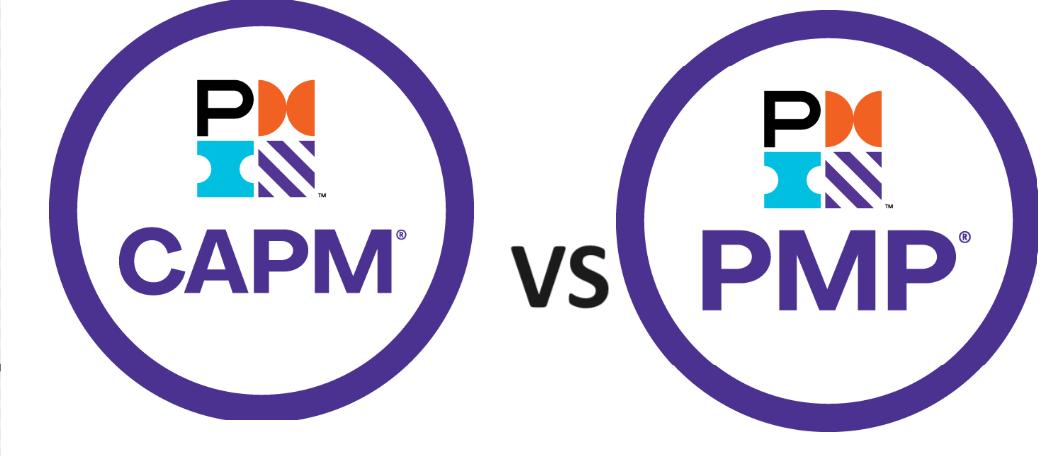Overview of CAPM and PMP
Certified Associate in Project Management (CAPM)
The CAPM certification is tailored for individuals who are new to project management or those with limited experience. It serves as an introductory credential that covers the fundamentals of project management as outlined in the Project Management Body of Knowledge (PMBOK® Guide).
- Eligibility Requirements:
- A secondary degree (high school diploma, associate’s degree, or equivalent).
- 23 hours of project management education completed before the exam.
- Exam Content: The CAPM exam tests knowledge of basic project management principles, including project integration, scope, time, cost, quality, resource, communication, risk, procurement, and stakeholder management.
- Ideal Candidates: This certification is perfect for entry-level project managers, students, recent graduates, or professionals seeking to transition into project management from other fields.
Project Management Professional (PMP)
The PMP certification is a globally recognized credential aimed at experienced project managers who lead and direct projects. It demonstrates a comprehensive understanding of advanced project management concepts and practices.
- Eligibility Requirements:
- A four-year degree with 36 months of project management experience and 35 hours of project management education, or
- A secondary degree with 60 months of project management experience and 35 hours of project management education.
- Exam Content: The PMP exam covers a broad spectrum of project management topics, including predictive, agile, and hybrid approaches. It emphasizes leadership, strategic, and business management skills.
- Ideal Candidates: This certification is suitable for seasoned project managers aiming for senior-level roles, those looking to validate their extensive project management experience, and professionals seeking to enhance their marketability.
Key Differences Between CAPM and PMP
Experience Level:
- CAPM: Designed for individuals with little to no project management experience. It provides foundational knowledge and helps beginners understand the core principles of project management.
- PMP: Intended for experienced project managers with a proven track record of managing projects. It validates advanced skills and expertise in the field.
Career Goals:
- CAPM: Ideal for those at the start of their project management careers. It helps secure entry-level positions and serves as a stepping stone towards more advanced certifications.
- PMP: Best suited for professionals aiming for higher-level positions, such as project managers, program managers, and project directors. It opens doors to more significant responsibilities and leadership roles.
Commitment and Preparation:
- CAPM: Requires less experience and preparation time compared to the PMP. The exam is less rigorous, making it more accessible for newcomers.
- PMP: Demands substantial project management experience and a significant commitment to studying. The exam is challenging and requires a deep understanding of complex project management concepts.
Global Recognition and Earning Potential:
- CAPM: While it is a respected certification, it does not carry the same weight as the PMP in terms of global recognition and earning potential. However, it provides a solid foundation for future growth.
- PMP: Highly regarded worldwide, the PMP certification significantly enhances your resume and often leads to higher salaries. According to PMI’s Earning Power: Project Management Salary Survey, PMP holders earn considerably more than their non-certified counterparts.
Benefits of CAPM
- Foundation in Project Management: CAPM offers a comprehensive introduction to project management principles and methodologies, providing a strong knowledge base for beginners.
- Career Entry: The certification helps candidates secure entry-level project management roles, internships, and junior positions, making it easier to start a career in project management.
- Stepping Stone to PMP: For those planning a long-term career in project management, CAPM is an excellent first step. It can pave the way for pursuing the PMP certification as you gain more experience.
Benefits of PMP
- Advanced Knowledge and Skills: The PMP certification demonstrates a high level of expertise in project management, covering advanced concepts and practices.
- Increased Job Opportunities: PMP certification is often a prerequisite for senior project management roles. It differentiates you from non-certified professionals and enhances your job prospects.
- Higher Salary Potential: PMP holders typically command higher salaries and enjoy better career advancement opportunities compared to those without the certification.
- Global Recognition: The PMP credential is recognized and respected worldwide, adding significant value to your professional profile and increasing your marketability in the global job market.
Making Your Decision
To determine which certification will best propel your career forward, consider your current situation and future goals:
- If You Are Starting Out: If you are new to project management or have minimal experience, the CAPM certification is a great choice. It provides foundational knowledge and helps you break into the field.
- If You Have Experience: If you already have substantial project management experience and are looking to advance to higher-level positions, the PMP certification is the way to go. It validates your expertise and opens doors to more advanced opportunities and higher earnings.
- Long-Term Career Plan: Consider your long-term career plan. If you aim to reach senior project management roles, starting with the CAPM and then progressing to the PMP as you gain experience can be a strategic approach.
Conclusion
Both the CAPM and PMP certifications offer significant benefits, but the right choice depends on where you are in your career and where you want to go. The CAPM is perfect for those at the beginning of their project management journey, providing a strong foundation and helping to secure entry-level positions. The PMP, on the other hand, is ideal for experienced professionals seeking to validate their skills and advance to senior roles with higher earning potential. By evaluating your experience, career goals, and commitment, you can choose the certification that will best propel your career forward.
Views: 0




Leave a Reply